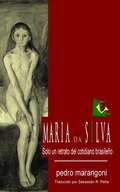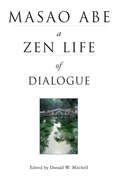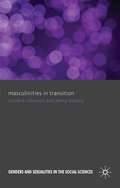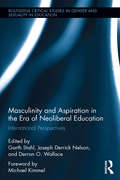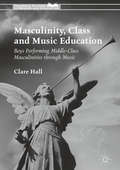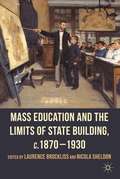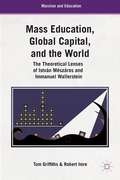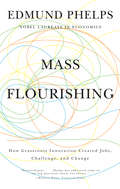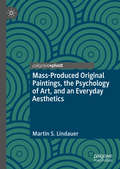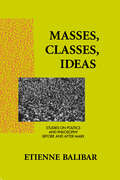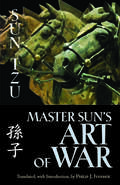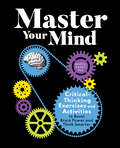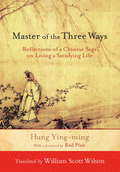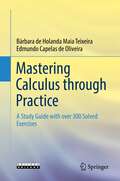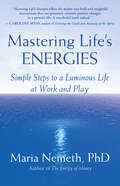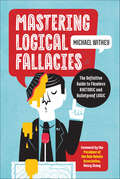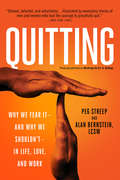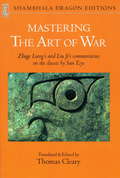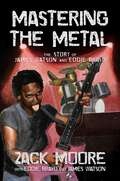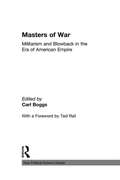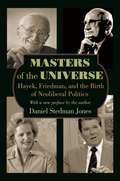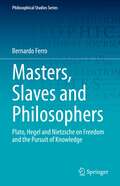- Table View
- List View
María da Silva, solo un retrato del cotidiano brasileño
by Pedro Marangoni Sebastián Rodolfo PeñaPresentación No se puede afirmar que “María da Silva” sea un trabajo de ficción puesto que es un retrato del cotidiano sin retoques. Un pequeño libro sobre la corta vida de una buscadora de basura en Brasil. No hay descripciones superfluas, de ese modo el lector compondrá el ambiente leyendo el drama com el escenario que conoce, que sucede cerca suyo, que ve en su día a día y cuya rigidez desconoce. Diariamente “Marías da Silva” mueren de inanición y de enfermedades no tratadas, en una breve tragedia pasada en la vida, llevándose consigo toda una historia ignorada por los demás ciudadanos. Ya es hora de verlas como seres humanos y este pequeño libro puede ayudar. Siento que la obra no es mía, solamente soy el presentador del mensaje de María da Silva. Creo que si algunos lectores después de conocerla cambien, aunque sea la mirada frente a los buscadores de basura – que buscan lo despreciado, no piden limosna - la misión que me confiaron por casualidad habrá sido cumplida.
Masao Abe a Zen Life of Dialogue
by Donald W. MitchellMasao Abe: A Zen Life of Dialogue is a compilation of essays that cover the life and work of Masao Abe, perhaps one of the greatest Zen Buddhist communicators of the twentieth century. Masao Abe has opened up a rich dialogue between Japan and the West. He is considered the leading living Zen figure in the Kyoto School of Buddhist thought and the successor of D.T. Suzuki, his early mentor, as the foremost exponent of Zen Buddhism in the West.Through stories and recollections, thrity-five leading intellectual figures explore Abe's encounter with the West, including his work on interfaith dialogue as a basis for world peace as well as his comparative philosophical scholarship over the past thirty years. This book is a retrospective and an extra ordinary step ahead in the encounter between Zen and the West.
Masao Abe a Zen Life of Dialogue
by Donald W. MitchellMasao Abe: A Zen Life of Dialogue is a compilation of essays that cover the life and work of Masao Abe, perhaps one of the greatest Zen Buddhist communicators of the twentieth century. Masao Abe has opened up a rich dialogue between Japan and the West. He is considered the leading living Zen figure in the Kyoto School of Buddhist thought and the successor of D.T. Suzuki, his early mentor, as the foremost exponent of Zen Buddhism in the West.Through stories and recollections, thrity-five leading intellectual figures explore Abe's encounter with the West, including his work on interfaith dialogue as a basis for world peace as well as his comparative philosophical scholarship over the past thirty years. This book is a retrospective and an extra ordinary step ahead in the encounter between Zen and the West.
Masao Abe a Zen Life of Dialogue
by Donald W. MitchellMasao Abe: A Zen Life of Dialogue is a compilation of essays that cover the life and work of Masao Abe, perhaps one of the greatest Zen Buddhist communicators of the twentieth century.Masao Abe has opened up a rich dialogue between Japan and the West. He is considered the leading living Zen figure in the Kyoto School of Buddhist thought and the successor of D.T. Suzuki, his early mentor, as the foremost exponent of Zen Buddhism in the West.Through stories and recollections, thirty-five leading intellectual figures explore Abe's encounter with the West, including his work on interfaith dialogue as a basis for world peace as well as his comparative philosophical scholarship over the past thirty years. This book is a retrospective and an extra ordinary step ahead in the encounter between Zen and the West.
Masculinities in Transition
by Victoria Robinson Jenny HockeyContributing to feminist approaches to masculinities, this book examines men's contextual experiences of masculine identity. Drawing on new data which compares men as they move across and between public and domestic spaces, it explores the implications of this for the nature of contemporary masculinity.
Masculinity and Aspiration in an Era of Neoliberal Education: International Perspectives (Routledge Critical Studies in Gender and Sexuality in Education)
by Garth Stahl Derron Wallace Joseph NelsonThis collection investigates the ways in which boys and young men negotiate neoliberal discourse surrounding aspiration and how neoliberalism shapes their identities. Expanding the field of masculinity studies in education, the contributors offer international comparisons of different subgroups of boys and young men in primary, secondary and university settings. A cross-sectional analysis of race, gender, and class theory is employed to illuminate the role of aspiration in shaping boys’ identities, which adds nuance to their complex "identity work" in neoliberal times.
Masculinity, Class and Music Education: Boys Performing Middle-Class Masculinities through Music (Palgrave Studies in Gender and Education)
by Clare HallThis book offers a provocative sociological examination of masculinity, class and music education within the context of a unique and fascinating culture: the classical musical world of choirboys. The myriad cultural meanings embodied in the ‘boy voice’ are unravelled through compelling musical narratives of young choirboys, their mothers, and their teachers. The book investigates how boys negotiate dominant gender-class discourses and the various pedagogies involved in producing middle-class masculinities during primary school and early years contexts. Drawing on the theoretical resources of Bourdieu to develop the concept of ‘musical habitus’, the continued symbolic distinction of the choirboy is analysed in order to better understand how culture is simultaneously reproduced and evolving through music. This interdisciplinary work at the juncture of pedagogy and culture will appeal to social science researchers, educators and arts practitioners interested in the sociocultural dynamics of music.
Mass Education and the Limits of State Building, c.1870–1930
by Laurence Brockliss Nicola SheldonThe first comparative study of the spread of mass education around the world in the late nineteenth and early twentieth centuries, this unique new book uses a bottom-up focus and demonstrates, to an extent not appreciated hitherto, the gulf between the intentions of the government and the reality on the ground.
Mass Education, Global Capital, And The World
by Tom G. Griffiths Robert ImreBy presenting a series of intricate analyses of educational phenomena through the theoretical lenses offered by Immanuel Wallerstein and Istv#65533;n M#65533;sz#65533;ros, the book engages readers and helps them to critically analyze their own participation in the global economy, as citizens, policy-makers, and academics or teachers.
Mass Flourishing: How Grassroots Innovation Created Jobs, Challenge, and Change
by Edmund S. PhelpsIn this book, Nobel Prize-winning economist Edmund Phelps draws on a lifetime of thinking to make a sweeping new argument about what makes nations prosper--and why the sources of that prosperity are under threat today. Why did prosperity explode in some nations between the 1820s and 1960s, creating not just unprecedented material wealth but "flourishing"--meaningful work, self-expression, and personal growth for more people than ever before? Phelps makes the case that the wellspring of this flourishing was modern values such as the desire to create, explore, and meet challenges. These values fueled the grassroots dynamism that was necessary for widespread, indigenous innovation. Most innovation wasn't driven by a few isolated visionaries like Henry Ford and Steve Jobs; rather, it was driven by millions of people empowered to think of, develop, and market innumerable new products and processes, and improvements to existing ones. Mass flourishing--a combination of material well-being and the "good life" in a broader sense--was created by this mass innovation. Yet indigenous innovation and flourishing weakened decades ago. In America, evidence indicates that innovation and job satisfaction have decreased since the late 1960s, while postwar Europe has never recaptured its former dynamism. The reason, Phelps argues, is that the modern values underlying the modern economy are under threat by a resurgence of traditional, corporatist values that put the community and state over the individual. The ultimate fate of modern values is now the most pressing question for the West: will Western nations recommit themselves to modernity, grassroots dynamism, indigenous innovation, and widespread personal fulfillment, or will we go on with a narrowed innovation that limits flourishing to a few? A book of immense practical and intellectual importance, Mass Flourishing is essential reading for anyone who cares about the sources of prosperity and the future of the West.
Mass-Produced Original Paintings, the Psychology of Art, and an Everyday Aesthetics
by Martin S. LindauerThis book examines the contribution of mass-produced original painting to the psychology of art, psychological aesthetics, and art criticism. Mass-produced paintings are an inexpensive, accessible, ubiquitous, and hand-painted popular art by anonymous artists or teams. Sold in an array of outlets, ranging from flea markets to shopping centers to cruise ships, they decorate hotels, offices, and homes. Addressed is their neglect in current scholarship in favor of a nearly exclusive investigation of the high arts and their audiences, as represented by museum paintings. Lindauer contextualizes his analysis by tracing the historical origins of this type of painting, popular art in general, and their evolutionary trajectory, exploring issues including: the impact of art and artists’ creativity on viewers; the overemphasis on originality and name recognition; what is art and who can be called an artist; and the extension of aesthetics to include an everyday kind. The book concludes with directions for future research in the popular and traditional arts, the psychology of art, and, more broadly, the ties that transcend barriers between science, the arts, and the humanities. It will appeal to students and scholars from across the fields of psychology, sociology, philosophy, art history, and cultural, media and communication studies.
Masses, Classes, Ideas: Studies on Politics and Philosophy Before and After Marx
by Etienne BalibarFirst published in 1994. Routledge is an imprint of Taylor & Francis, an informa company.
Master Sun's Art of War
by Sun Tzu Philip J. IvanhoePhilip J. Ivanhoe's translation of Sun Tzu's Art of War will be warmly embraced by students. His discussion in the Introduction about the text's dating and authorship, as well as Chinese attitudes towards things military, is concise, informative, and up-to-date. The translation itself is a marvel--its language is simple and direct, making it immensely readable and clear.--Keith Knapp, is Westvaco Professor of National Security Studies, Department of History, The Citadel, The Military College of South Carolina
Master Your Mind: Critical-Thinking Exercises and Activities to Boost Brain Power and Think Smarter
by Marcel DanesiSharpen critical thinking skills and power your brain—for life Think of your mind like a muscle. It must be exercised regularly to get stronger—and for you to get smarter. Master Your Mind will get your brain in shape by helping you cultivate the principles of critical thinking through perplexing puzzles, engaging exercises based on real-world scenarios, interesting case studies, and practical strategies. This modern critical thinking workbook will teach you how to be on your toes mentally, filtering information, decoding it logically and with reason, and assessing it for validity. You'll learn to think twice—perhaps three times—and become a better decision-maker and problem-solver. Master Your Mind delivers: An effective approach—Get a concise look at critical thinking skills, including analysis, objectivity, evaluation, reasoning, deduction, problem-solving, and decision-making. Fun activities—Explore challenging, logic-based exercises that are based on real-world experiences, and learn to develop essential skills in your personal and professional life, especially in the digital age. Mental fitness for life—Learn best practices to incorporate critical thinking into your daily existence for the long term, always keep an open mind, and become a lifelong learner. Train your brain so you can become smarter and more creative with this complete critical thinking workbook.
Master of the Three Ways: Reflections of a Chinese Sage on Living a Satisfying Life
by Bill Porter William Scott Wilson Hung Ying-MingAt once profound, spiritual, and witty, Master of the Three Ways is a remarkable work about human nature, the essence of life, and how to live simply and with awareness. In three hundred and fifty-seven verses, the author, Hung Ying-ming--a seventeenth-century Chinese sage--explores good and evil, honesty and deception, wisdom and foolishness, and heaven and hell. He draws from the wisdom of the "Three Creeds"--Taoism, Confucianism, and Zen Buddhism--to impress upon us that by combining simple elegance with the ordinary, we can make our lives artistic and poetic. This sense, along with a particular understanding of Zen that makes art from the simple in everyday life, has permeated Chinese and Japanese culture to this day. The work is divided into two books. The first generally deals with the art of living in society and the second is concerned with man's solitude and contemplations of nature. These themes repeatedly spill over into each other, creating multiple levels of meaning.
Mastering Calculus through Practice: A Study Guide with over 300 Solved Exercises
by Edmundo Capelas de Oliveira Bárbara de TeixeiraThis textbook covers key topics of Elementary Calculus through selected exercises, in a sequence that facilitates development of problem-solving abilities and techniques. It opens with an introduction to fundamental facts of mathematical logic, set theory, and pre-calculus, extending toward functions, limits, derivatives, and integrals. Over 300 solved problems are approached with a simple, direct style, ordered in a way that positively challenges students and helps them build self-confidence as they progress. A special final chapter adds five carefully crafted problems for a comprehensive recap of the work.The book is aimed at first-year students of fields in which calculus and its applications have a role, including Science, Technology, Engineering, Mathematics, Economics, Architecture, Management, and Applied Social Sciences, as well as students of Quantitative Methods courses. It can also serve as rich supplementary reading for self-study.
Mastering Life's Energies: Simple Steps to a Luminous Life at Work and Play
by Maria NemethEveryone has had luminous moments — those instances when we experience the beauty and grace of life, whether we’re looking into the eyes of a newborn or watching the sun set over the ocean. But those moments are usually brief and difficult to consciously create. Many of us have been successful in attaining personal and professional goals, but we’re too exhausted to enjoy what we’ve accomplished. Or we might walk around in a fog, feeling vaguely frustrated, resigned, or cynical and asking all the wrong questions about how to make our lives better. In either case, we miss the purpose of being alive: to wake up and fully become ourselves, to allow others to contribute to us and, in turn, to contribute our gifts to the world — fully savoring the journey along the way. This fascinating new book gives us specific methods for bringing luminosity into our lives on a consistent basis, allowing us to view the world with much younger, more vibrant eyes. Mastering Life’s Energies shows us how to use all the energies of our lives — physical vitality, creativity, time, money, enjoyment, and relationship — to realize our goals and dreams and, even more important, live a luminous life, filled with possibility and promise.
Mastering Logical Fallacies: The Definitive Guide to Flawless Rhetoric and Bulletproof Logic
by Michael Withey"If I have learned anything in ten years of formal debating, it is that arguments are no different: without a good understanding of the rules and tactics, you are likely to do poorly and be beaten."—HENRY ZHANG, President of the Yale Debate AssociationYour argument is valid and you know it; yet once again you find yourself leaving a debate feeling defeated and embarrassed. The matter is only made worse when you realize that your defeat came at the hands of someone's abuse of logic—and that with the right skills you could have won the argument.The ability to recognize logical fallacies when they occur is an essential life skill. Mastering Logical Fallacies is the clearest, boldest, and most systematic guide to dominating the rules and tactics of successful arguments. This book offers methodical breakdowns of the logical fallacies behind exceedingly common, yet detrimental, argumentative mistakes, and explores them through real life examples of logic-gone-wrong.Designed for those who are ready to gain the upper hand over their opponents, this master class teaches the necessary skills to identify your opponents' misuse of logic and construct effective, arguments that win. With the empowering strategies offered in Mastering Logical Fallacies you'll be able to reveal the slight-of-hand flaws in your challengers' rhetoric, and seize control of the argument with bulletproof logic.
Mastering the Art of Quitting: Why We Fear It -- and Why We Shouldn't -- in Life, Love, and Work
by Peg Streep Lcsw Alan B. BernsteinFind out why the happiest, most successful people have the ability both to persist and to quit Do you believe that "winners never quit and quitters never win"? Do you tend to hang in longer than you should, even when you're unhappy? Our culture usually defines quitting as admitting defeat, but persistence isn't always the answer: When a goal is no longer useful, we need to be able to quit to get the most out of life. In Quitting, bestselling author Peg Streep and psychotherapist Alan Bernstein reveal simple truths that apply to goal setting and achievement in all areas of life, including work, love, and relationships: Without the ability to give up, most people will end up in a discouraging loop. Quitting is a healthy, adaptive response when a goal can't be reached. Quitting permits growth and learning, as well as the ability to frame new goals. Featuring compelling stories of people who successfully quit, along with helpful questionnaires and goal maps to guide you on the right path, Quitting will help you evaluate whether your goals are working for or against you, and whether you need to let go in order to start anew.
Mastering the Art of War
by Thomas Cleary Liang Zhuge Liu JiComposed by two prominent statesmen-generals of classical China, this book develops the strategies of Sun Tzu's classic, The Art of War , into a complete handbook of organization and leadership. The great leaders of ancient China who were trained in Sun Tzu's principles understood how war is waged successfully, both materially and mentally, and how victory and defeat follow clear social, psychological, and environmental laws. Drawing on episodes from the panorama of Chinese history, Mastering the Art of War presents practical summaries of these essential laws along with tales of conflict and strategy that show in concrete terms the proper use of Sun Tzu's principles. The book also examines the social and psychological aspects of organization and crisis management. The translator's introduction surveys the Chinese philosophies of war and conflict and explores in depth the parallels between The Art of War and the oldest handbook of strategic living, the I Ching (Book of Changes).
Mastering the Metal: The Story of James Watson and Eddie Bravo
by James Watson Zack MooreOver the last two decades, Eddie Bravo has been at the forefront of revolutions we&’ve seen in the arts of fighting, comedy, and podcasting. But he wasn&’t alone in his journey.For just over a decade, James Watson and Eddie Bravo were inseparable: musical partners, work colleagues, roommates, and best friends. From metal to rap, our protagonists worked to master the art of music together. Through the story of these past experiences in the pursuit of musical mastery, the reader will get to intimately understand Eddie Bravo and see how those experiences in his youth spent in music made him the man and martial artist he is today. Through the narration of our author, we get the complete picture of the private man behind the Eddie Bravo public persona.
Masterpieces on Japan by Foreign Authors: From Goncharov to Pinguet
by Shōichi Saeki Tōru HagaThis open access book includes forty-one chapters about foreign observers’ discourses on Japan. These include a wide range of perspectives from the travelogues of curious visitors to academic theses by scholars, which offer us a broad spectrum of contents, reflecting a variety of attitudes toward Japan. The works were written during the period from the 1850s to the 1980s, a timespan during which Japan became, in stages, more open to the outside world after a long isolation under the Tokugawa shogunate. From the perspective of “Japanology,” one can discern three distinct periods of rising interest in the country from abroad. The first tide of such interest came shortly after the opening of Japan, when various foreign travelers, including those who could not be included in this book, came over and wrote down their impressions of the country—which was, for them, a land of mystery and mystique, which had just opened its doors to them. The second wave arose at the beginning of the twentieth century, just after the Russo-Japanese War, when Japan again generated a remarkable surge of interest as a “miracle” in Asia that had pulled off the wondrous feat of defeating a white superpower. The third wave was more recent, which took place from the late 1960s to the 1980s, a period of high economic growth when the “miracle” of Japan’s remarkable economic recovery from the defeat of World War II attracted enthusiastic and curious attention from the outside world once again. It is not the intention of this book to directly highlight such historical transitions, but these forty-two brilliant mirrors (forty-one chapters, including forty-two discourses), even when looked in casually, provide us with unexpected insights and various perspectives. Shōichi Saeki (1922–2016) was Professor Emeritus, the University of Tokyo. Tōru Haga (1931–2020) was Professor Emeritus, International Research Center for Japanese Studies.
Masters of War: Militarism and Blowback in the Era of American Empire (New Political Science Reader)
by Ted Rall Carl BoggsFirst published in 2003. Routledge is an imprint of Taylor & Francis, an informa company.
Masters of the Universe: Hayek, Friedman, and the Birth of Neoliberal Politics - Updated Edition
by Daniel Stedman JonesHow radical free-market ideas achieved mainstream dominance in postwar America and BritainBased on archival research and interviews with leading participants in the movement, Masters of the Universe traces the ascendancy of neoliberalism from the academy of interwar Europe to supremacy under Reagan and Thatcher and in the decades since. Daniel Stedman Jones argues that there was nothing inevitable about the victory of free-market politics. Far from being the story of the simple triumph of right-wing ideas, the neoliberal breakthrough was contingent on the economic crises of the 1970s and the acceptance of the need for new policies by the political left. This edition includes a new foreword in which the author addresses the relationship between intellectual history and the history of politics and policy.Fascinating, important, and timely, this is a book for anyone who wants to understand the history behind the Anglo-American love affair with the free market, as well as the origins of the current economic crisis.
Masters, Slaves and Philosophers: Plato, Hegel and Nietzsche on Freedom and the Pursuit of Knowledge (Philosophical Studies Series #149)
by Bernardo FerroThis book examines the relationship between freedom and true knowledge, which is a central part of the hotly debated issue of human freedom. Is truth necessary for the attainment of freedom? Does a free life require a clear understanding of reality? And if so, to what extent? These questions lead back to a classical philosophical debate, of which the first major chapter was written by Plato. In the dialogues, he describes human life as a peculiar form of imprisonment and calls for a global liberation of human cognition. This work analyses this ambitious project and its unique influence on the work of two modern authors, Hegel and Nietzsche, who explicitly linked the notions of ignorance and truth to those of bondage and freedom—or slavery and mastery—and whose philosophies are also centred on the liberation of human consciousness. Following a historical and systematic approach, this book is of interest to readers who are reasonably acquainted with the history of ancient and modern philosophy, including undergraduate and graduate students, as well as scholars working on Plato, German Idealism, Nietzsche and other related fields.
